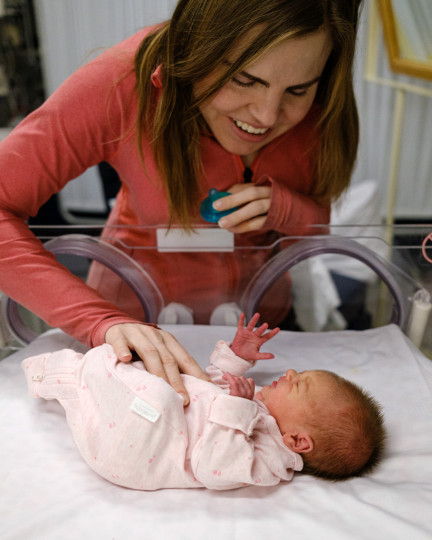A new initiative between the family newborn care unit and the neonatal intensive care unit (NICU) of IWK Health now means that fewer newborns and their birth parent will need to be separated when they both need care. Couplet care minimizes separation between parent and newborn and improves the overall care of both patients.
“Providing couplet care aligns with the evidence that demonstrates many benefits to keeping the parent and infant together,” says Gail MacRae, Clinical Nurse Specialist in the IWK NICU. “It demonstrates our ongoing commitment to family integrated care and our value of establishing partnerships in care with families.”
When a couplet (postpartum patient and baby) is admitted together into the NICU, the infant gets the ICU care they need, and the postpartum patient gets the postpartum care they need. It also means full feeds and breastfeeding are established earlier, and both are enjoying the tremendous benefits of skin-to-skin care. Often, they are ready to leave the hospital earlier with an improved attachment between parent and baby. It also leads to improved mental health of the postpartum patient and improved confidence of the parent in caring for their infant.
“Couplet Care is maintaining the parent-baby dyad by moving the postpartum patient's space and the care that would typically occur on Family Newborn Care Unit (FNCU) to the NICU where baby would receive care,” says Allyson Falconer, a postpartum nurse working on the IWK FNCU. “A postpartum nurse from Family Newborn provides the postpartum patient's care while a NICU nurse provides the care of the infant in the same room.”
“Couplet care was crucial for us,” says parent Laura Fraser. “It allowed me to be a part of Molly’s care rather than being separated by several floors in the hospital. It’s very distressing to be separated from your baby at birth and in the hours and days afterward, so having couplet care helped both me and my husband bond with our baby at a time when both she and I needed specialized care.”
Couplet care, often called rooming in, has been in place for years on the IWK postpartum unit where parents and infants stay together in the same room. However, when a baby had to be admitted into the NICU, there was inevitable separation between parent/mother and infant. The postpartum patient would go to the fifth floor, and the baby stayed in the NICU on the third floor. Although there were no restrictions to parental access to the NICU, it is challenging for a parent to be in the NICU continuously due to their needs after birth.
“Our baby has become very bonded to us and we were able to help her regain her birth weight in the two and a half weeks we spent in NICU,” says Fraser. “By rooming in with her, she knew that we were right there to immediately respond to her cues and cries — and she became more confident in feeding in the latter half of our stay.”
Couplet care also holds benefits for staff.
“Providing care together in the same space but from different teams is relationship building,” says MacRae. “It was the engagement and belief of key partners across IWK that brought it all together. Partners included the lab, diagnostic imaging, pharmacy, health information services, security, biomedical, nutrition services, clinical teams, patient safety, IPAC...just to name a few. Everyone believed in the project and offered flexibility in their services to ensure it could happen.”
“FNCU nurses have a charting space within the NICU and FNCU nurses now carry one ‘Couplet Care’ iPhone that is connected to the communication system within NICU so that our staff can be fully integrated into the parent-dyads care,” says Falconer. “Our staff have always collaborated during transfers of patients, but with this new collaboration, our staff are sharing spaces and working even closer with one another.”
“At the end of the day, we all want to be able to say we provided the best care we could and couplet care puts us in a position to be able to say just that,” says MacRae. “It is an added layer of providing excellence in care to b
